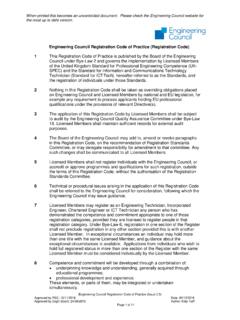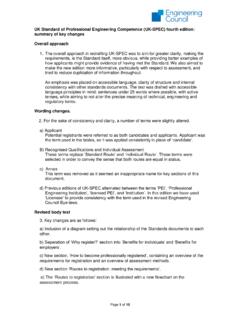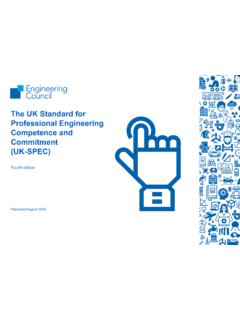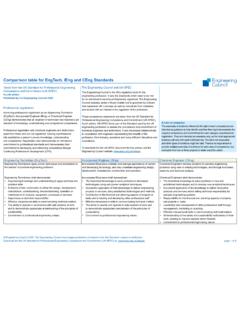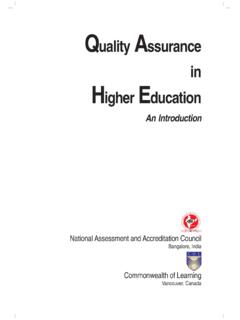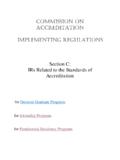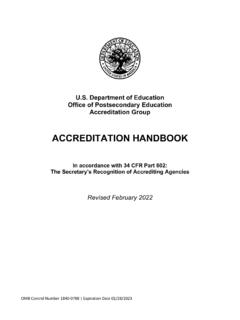Transcription of The Accreditation of Higher Education Programmes (AHEP)
1 The Accreditation of Higher Education Programmes (AHEP)Fourth editionPublished August 20202 Hierarchy of regulations and prescribed standardsThe Engineering Council is the UK s regulatory body for the engineering profession. It operates under a Royal Charter and is governed by a Board that represents UK Licensees as well as individuals from industries and sectors with an interest in the regulation of the profession. This document is one in a series of closely related publications: Registration Code of Practice (RCoP) The UK Standard for Professional Engineering Competence and Commitment (UK-SPEC) Information and Communications Technology Technician Standard (ICTTech Standard) Approval and Accreditation of Qualifications and Apprenticeships (AAQA) Accreditation of Higher Education Programmes (AHEP)The Engineering Council publishes these documents on behalf of the UK engineering profession, with whom they were developed and are kept under review.
2 The relationship between these publications is:3 Royal CharterUK-SPEC and ICTTech Standard are prescribed Standards that, with reference to RCoP, set out the competence and commitment required for registration as CEng, IEng, EngTech and and AHEP are prescribed Standards that, with reference to RCoP, set out the policy, context, rules and procedures for recognising learning and development Programmes that help develop the competence and commitment set out in UK-SPEC and ICTTech Royal Charter is an instrument of incorporation granted by the UK monarch. It confers independent legal personality on the Engineering Council and defines its objectives, constitution and powers to govern its own Bye-laws are the rules by which the Engineering Council regulates sets out the regulations that Licensees of the Engineering Council must adhere to when registering applicants, recognising Programmes of learning and development, and undertaking related processes.
3 These are expanded on in the four prescribed Standards Engineering Council also publishes policy statements, guidance for institutions and guidance for individuals. These, along with all the publications listed above are available on the Engineering Council website: and Technicians are concerned with the art and practice of changing our world. Responding to the needs of society and business, they solve complex challenges and in doing so enhance welfare, health and safety whilst paying due regard to the places great faith in the engineering profession, trusting its members to regulate themselves. By achieving and demonstrating professional competence and commitment for the purpose of registration, engineers and technicians demonstrate that they are worthy of that document, the Accreditation of Higher Education Programmes (AHEP), forms part of the standard used by the UK engineering profession to assess the competence and commitment of individual engineers and technicians.
4 It was developed collaboratively, in consultation with engineers representing the breadth of the profession: from industry, academia and many different disciplines and specialisms. The AHEP Standard was first published by the Engineering Council in 2004 and since then has been widely used by HEIs, individual academics and Licensees. It has developed in consultation with the profession, including input from employers in industry and engineering academics. It has enabled the development of diverse provision, without losing sight of the required skills, knowledge and understanding that tomorrow s engineers will need. ContentsForeword 4 Welcome 5 Introduction 6 Differences in this edition 7 Accreditation 8 Characteristics of an accredited programme 10 Information reviewed during Accreditation 13 Alternatives to campus-based provision 16 Initial application 17 Once Accreditation is awarded
5 19 Generic learning outcomes and defining characteristics 22 Defining characteristics of approved and accredited Programmes 23 Learning outcomes AHEP, fourth edition 26 International recognition 38 Glossary 405 WelcomeWherever it appears in this document, Accreditation refers to the Accreditation of Programmes delivered within Higher a full and current list of accredited degrees please see: purpose of AHEPThis document sets out the requirements for the Accreditation of Higher Education Programmes (AHEP). The primary purpose of AHEP is to set out the required overall standard to be achieved by engineering Higher Education Programmes if they are to be accredited by the Engineering Council.
6 This document also: explains the benefits of Accreditation of Higher Education Programmes identifies what indicators are considered when judging whether a programme should be accredited sets out the learning outcomes that Programmes must meet to become accredited outlines how to apply for Accreditation outlines how the Engineering Council ensures that accredited Programmes are internationally reviewing a Higher Education programme for the purpose of Accreditation , Licensees assess whether that programme provides some, or all, of the knowledge and understanding that underpin eventual registration in the following registration categories: Incorporated Engineer (IEng) Chartered Engineer (CEng) Who is AHEP for?Many different groups will find this document useful.
7 However, it has been written primarily for: Licensees undertaking Accreditation reviews Higher Education Institutions (HEIs) that may wish to seek Accreditation for one or more of their degree apprenticeships, as well as Education and training Programmes which are not delivered by HEIs, see the Engineering Council s Approval and Accreditation of Qualifications and Apprenticeships (AAQA) informationThroughout this document some key information, terms and crucial points will be picked out in boxed text like this to help navigation. GlossaryAt the end of AHEP there is a glossary that explains some of the terms we use. LicenseeThroughout this document the term Licensee is used to describe the engineering institutions that have been licensed by the Engineering Council Board to assess individuals for professional registration.
8 To become Licensees organisations must pass a rigorous process demonstrating, to the satisfaction of the Engineering Council Board, that they are competent to perform this task and to regulate the conduct of their members. Additionally, Licensees can be licensed to approve or accredit Programmes of learning and competence development to specific standards. Licensees are sometimes known informally as Professional Engineering Institutions, or PEIs. For a full and current list of Licensees please see: engineering students deserve a world-class Education that develops industry-relevant skills. Accreditation of degree Programmes helps to: Ensure that UK engineering Education provides those industry-relevant skills Draw students towards a career in the engineering profession Demonstrate, both nationally and internationally, the high standard of UK engineering Education Provides a basis for HEIs to review their Programmes and develop excellence in delivery and contentThe criteria and process of Accreditation are regularly reviewed internationally.
9 The Engineering Council is a full member of the Sydney and Washington Accords, demonstrating that its Accreditation process is compatible with the standards of the International Engineering Alliance (IEA). This also demonstrates that the learning outcomes set by the Engineering Council meet or exceed the Graduate Attributes thresholds published by the IEA. Alignment has also been demonstrated with the European Network for Accreditation of Engineering Education (ENAEE) s EUR-ACE framework, resulting in the Engineering Council being authorised to award the EUR-ACE label to engineering Programmes accredited for CEng registration. The learning outcomes remain aligned with international standards, including the Washington and Sydney Accords and EUR-ACE Framework Standards and Guidelines (EAFSG).
10 The levels of degree Programmes that may be accredited have been referenced to ISCED (International Standard Classification of Education ). Further details about 7international recognition for accredited degrees can be found page 9 and page have a crucial role to play in helping to solve the world s problems, ensuring the benefits of innovation and progress are shared equitably and do not compromise the natural environment or deplete natural resources to the detriment of future generations. The ambitions of countries around the world to achieve net zero carbon emissions can only be met through the development of innovative clean technologies. Similarly, engineering and technological innovation is central to delivering the United Nations Sustainable Development graduates need a range of skills in order to create, develop or apply new technologies.

